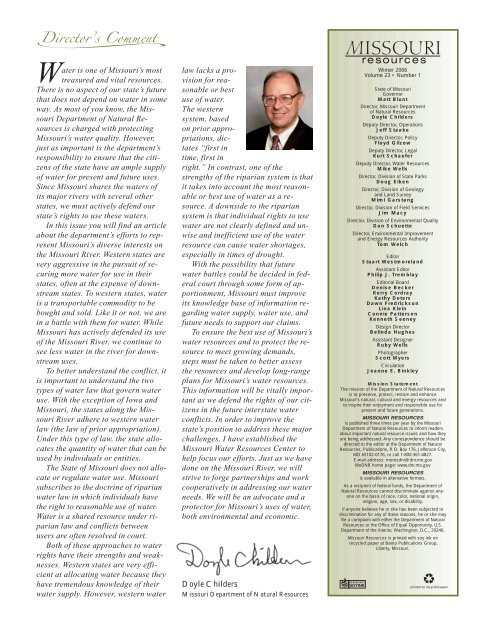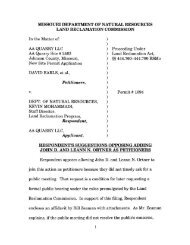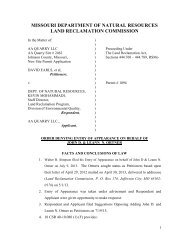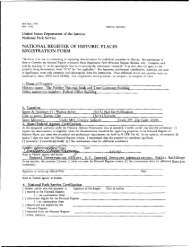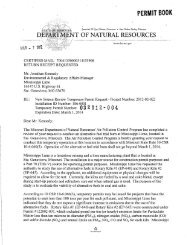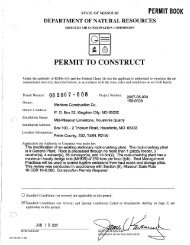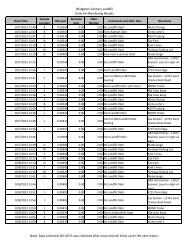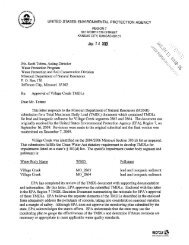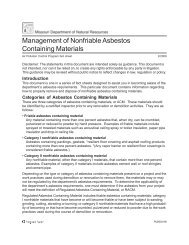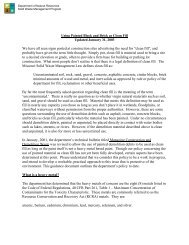Winter 2006 - Missouri Department of Natural Resources
Winter 2006 - Missouri Department of Natural Resources
Winter 2006 - Missouri Department of Natural Resources
Create successful ePaper yourself
Turn your PDF publications into a flip-book with our unique Google optimized e-Paper software.
Water is one <strong>of</strong> <strong>Missouri</strong>’s most<br />
treasured and vital resources.<br />
There is no aspect <strong>of</strong> our state’s future<br />
that does not depend on water in some<br />
way. As most <strong>of</strong> you know, the <strong>Missouri</strong><br />
<strong>Department</strong> <strong>of</strong> <strong>Natural</strong> <strong>Resources</strong><br />
is charged with protecting<br />
<strong>Missouri</strong>’s water quality. However,<br />
just as important is the department’s<br />
responsibility to ensure that the citizens<br />
<strong>of</strong> the state have an ample supply<br />
<strong>of</strong> water for present and future uses.<br />
Since <strong>Missouri</strong> shares the waters <strong>of</strong><br />
its major rivers with several other<br />
states, we must actively defend our<br />
state’s rights to use these waters.<br />
In this issue you will find an article<br />
about the department’s efforts to represent<br />
<strong>Missouri</strong>’s diverse interests on<br />
the <strong>Missouri</strong> River. Western states are<br />
very aggressive in the pursuit <strong>of</strong> securing<br />
more water for use in their<br />
states, <strong>of</strong>ten at the expense <strong>of</strong> downstream<br />
states. To western states, water<br />
is a transportable commodity to be<br />
bought and sold. Like it or not, we are<br />
in a battle with them for water. While<br />
<strong>Missouri</strong> has actively defended its use<br />
<strong>of</strong> the <strong>Missouri</strong> River, we continue to<br />
see less water in the river for downstream<br />
uses.<br />
To better understand the conflict, it<br />
is important to understand the two<br />
types <strong>of</strong> water law that govern water<br />
use. With the exception <strong>of</strong> Iowa and<br />
<strong>Missouri</strong>, the states along the <strong>Missouri</strong><br />
River adhere to western water<br />
law (the law <strong>of</strong> prior appropriation).<br />
Under this type <strong>of</strong> law, the state allocates<br />
the quantity <strong>of</strong> water that can be<br />
used by individuals or entities.<br />
The State <strong>of</strong> <strong>Missouri</strong> does not allocate<br />
or regulate water use. <strong>Missouri</strong><br />
subscribes to the doctrine <strong>of</strong> riparian<br />
water law in which individuals have<br />
the right to reasonable use <strong>of</strong> water.<br />
Water is a shared resource under riparian<br />
law and conflicts between<br />
users are <strong>of</strong>ten resolved in court.<br />
Both <strong>of</strong> these approaches to water<br />
rights have their strengths and weaknesses.<br />
Western states are very efficient<br />
at allocating water because they<br />
have tremendous knowledge <strong>of</strong> their<br />
water supply. However, western water<br />
law lacks a provision<br />
for reasonable<br />
or best<br />
use <strong>of</strong> water.<br />
The western<br />
system, based<br />
on prior appropriations,dictates<br />
“first in<br />
time, first in<br />
right.” In contrast, one <strong>of</strong> the<br />
strengths <strong>of</strong> the riparian system is that<br />
it takes into account the most reasonable<br />
or best use <strong>of</strong> water as a resource.<br />
A downside to the riparian<br />
system is that individual rights to use<br />
water are not clearly defined and unwise<br />
and inefficient use <strong>of</strong> the water<br />
resource can cause water shortages,<br />
especially in times <strong>of</strong> drought.<br />
With the possibility that future<br />
water battles could be decided in federal<br />
court through some form <strong>of</strong> apportionment,<br />
<strong>Missouri</strong> must improve<br />
its knowledge base <strong>of</strong> information regarding<br />
water supply, water use, and<br />
future needs to support our claims.<br />
To ensure the best use <strong>of</strong> <strong>Missouri</strong>’s<br />
water resources and to protect the resource<br />
to meet growing demands,<br />
steps must be taken to better assess<br />
the resources and develop long-range<br />
plans for <strong>Missouri</strong>’s water resources.<br />
This information will be vitally important<br />
as we defend the rights <strong>of</strong> our citizens<br />
in the future interstate water<br />
conflicts. In order to improve the<br />
state’s position to address these major<br />
challenges, I have established the<br />
<strong>Missouri</strong> Water <strong>Resources</strong> Center to<br />
help focus our efforts. Just as we have<br />
done on the <strong>Missouri</strong> River, we will<br />
strive to forge partnerships and work<br />
cooperatively in addressing our water<br />
needs. We will be an advocate and a<br />
protector for <strong>Missouri</strong>’s uses <strong>of</strong> water,<br />
both environmental and economic.<br />
Doyle Childers<br />
<strong>Missouri</strong> <strong>Department</strong> <strong>of</strong> <strong>Natural</strong> <strong>Resources</strong><br />
<strong>Winter</strong> <strong>2006</strong><br />
Volume 23 • Number 1<br />
State <strong>of</strong> <strong>Missouri</strong><br />
Governor<br />
Matt Blunt<br />
Director, <strong>Missouri</strong> <strong>Department</strong><br />
<strong>of</strong> <strong>Natural</strong> <strong>Resources</strong><br />
Doyle Childers<br />
Deputy Director, Operations<br />
Jeff Staake<br />
Deputy Director, Policy<br />
Floyd Gilzow<br />
Deputy Director, Legal<br />
Kurt Schaefer<br />
Deputy Director, Water <strong>Resources</strong><br />
Mike Wells<br />
Director, Division <strong>of</strong> State Parks<br />
Doug Eiken<br />
Director, Division <strong>of</strong> Geology<br />
and Land Survey<br />
Mimi Garstang<br />
Director, Division <strong>of</strong> Field Services<br />
Jim Macy<br />
Director, Division <strong>of</strong> Environmental Quality<br />
Dan Schuette<br />
Director, Environmental Improvement<br />
and Energy <strong>Resources</strong> Authority<br />
Tom Welch<br />
Editor<br />
Stuart Westmoreland<br />
Assistant Editor<br />
Philip J. Tremblay<br />
Editorial Board<br />
Denise Becker<br />
Kerry Cordray<br />
Kathy Deters<br />
Dawn Fredrickson<br />
Lina Klein<br />
Connie Patterson<br />
Kenneth Seeney<br />
Design Director<br />
Belinda Hughes<br />
Assistant Designer<br />
Ruby Wells<br />
Photographer<br />
Scott Myers<br />
Circulation<br />
Jeanne E. Binkley<br />
Mission Statement<br />
The mission <strong>of</strong> the <strong>Department</strong> <strong>of</strong> <strong>Natural</strong> <strong>Resources</strong><br />
is to preserve, protect, restore and enhance<br />
<strong>Missouri</strong>’s natural, cultural and energy resources and<br />
to inspire their enjoyment and responsible use for<br />
present and future generations.<br />
MISSOURI RESOURCES<br />
is published three times per year by the <strong>Missouri</strong><br />
<strong>Department</strong> <strong>of</strong> <strong>Natural</strong> <strong>Resources</strong> to inform readers<br />
about important natural resource issues and how they<br />
are being addressed. Any correspondence should be<br />
directed to the editor at the <strong>Department</strong> <strong>of</strong> <strong>Natural</strong><br />
<strong>Resources</strong>, Publications, P. O. Box 176, Jefferson City,<br />
MO 65102-0176, or call 1-800-361-4827.<br />
E-mail address: moresdnr@dnr.mo.gov<br />
MoDNR home page: www.dnr.mo.gov<br />
MISSOURI RESOURCES<br />
is available in alternative formats.<br />
As a recipient <strong>of</strong> federal funds, the <strong>Department</strong> <strong>of</strong><br />
<strong>Natural</strong> <strong>Resources</strong> cannot discriminate against anyone<br />
on the basis <strong>of</strong> race, color, national origin,<br />
religion, age, sex, or disability.<br />
If anyone believes he or she has been subjected to<br />
discrimination for any <strong>of</strong> these reasons, he or she may<br />
file a complaint with either the <strong>Department</strong> <strong>of</strong> <strong>Natural</strong><br />
<strong>Resources</strong> or the Office <strong>of</strong> Equal Opportunity, U.S.<br />
<strong>Department</strong> <strong>of</strong> the Interior, Washington, D.C., 20240.<br />
<strong>Missouri</strong> <strong>Resources</strong> is printed with soy ink on<br />
recycled paper at Banta Publications Group,<br />
Liberty, <strong>Missouri</strong>.<br />
printed on recycled paper


